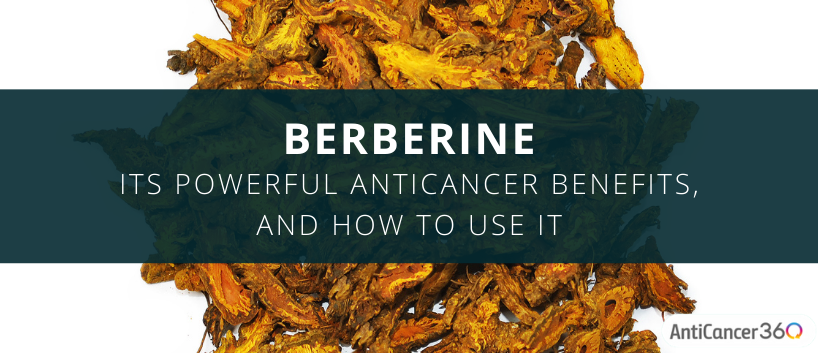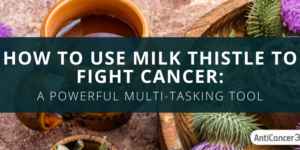When you’re fighting cancer, it’s important to support your body in every way possible. Fortunately, there are many strategies that you can consider, in addition to your oncologist’s treatments. This is especially important for difficult and later stage cancers.
Overall, there are many anticancer substances and strategies that can help you ”fight cancer from every direction.” And though it depends on your particular situation… berberine may be one of these options.
So in today’s post, we’re going to show you the science behind berberine’s many potential anticancer benefits. Ultimately… berberine is a safe, natural cancer-fighting substance that can help to starve the cancer, and fight it from many different angles.
What is Berberine?
Berberine is a bitter-tasting alkaloid found in the roots and stems of various plants such as goldenseal and barberry [1]. Berberine is also found in the traditional Chinese medicinal herb Rhizoma coptidis, which has a long history in the treatment of diarrhea, digestive diseases, inflammation, and heart disease.
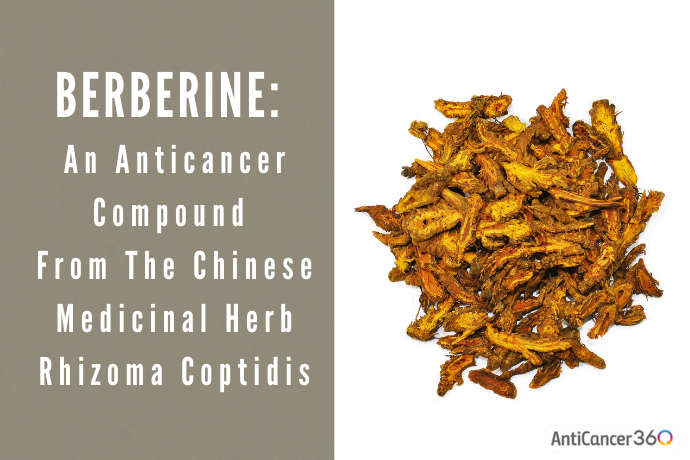
Berberine is most well-known for its ability to help lower blood sugar and keep it under control [2]. But most importantly for today’s post, many studies have shown berberine to have potential antitumor effects on many forms of cancer [2].
How to Starve Cancer with Berberine: Cancer Metabolism Suppression
Cancer metabolism refers to the ways with which cancer feeds itself and makes energy. So one of the critical cancer-fighting strategies is exploring how to starve cancer with drugs and natural supplements.
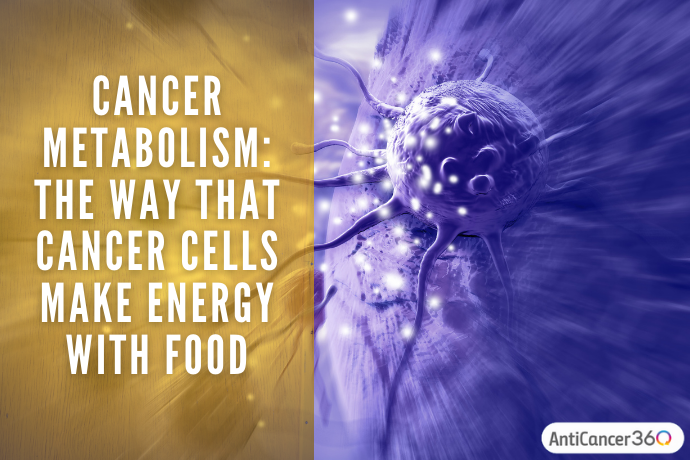
In this sense, we aim to block sugar, fats, and proteins from being processed by cancer cells. This strategy weakens the cancer cells, and can make them more vulnerable to cancer treatments. Fortunately, many natural substances show potential in blocking cancer metabolism pathways. One of these substances is berberine.
Berberine May Help To Starve The Cancer Of Sugar
Targeting cancer’s sugar and insulin related mechanisms can be an important strategy in many cases.
Insulin is a hormone made by the pancreas that promotes the absorption of glucose (sugar) from the blood into cells. Insulin resistance occurs when excessive blood glucose diminishes the cells’ ability to absorb blood sugar to use for energy. This resistance initially causes the pancreas to secrete more and more insulin into the bloodstream.
Insulin also has direct tumor-causing effects on cancer cells. Chronically high insulin levels in the blood) have also been linked to colorectal cancer, pancreatic cancer, endometrial cancer, and breast cancer [3].
Berberine lowers blood glucose in normal, healthy cells by decreasing insulin resistance and improving glucose tolerance. Berberine activates glucose transporters, such as GLUT1, which increases glucose uptake into healthy cells [3].
Clinical studies have shown that berberine may be just as effective as metformin at supporting healthy blood sugar levels. Metformin is the most popular oral medication prescribed for prediabetes and type 2 diabetes [4].
Insulin-lowering substances, such as metformin and berberine, may be useful in lowering insulin levels and insulin resistance, improving cancer outcomes in patients with type 2 diabetes [5].
But berberine appears to have a paradoxical effect in terms of its blood sugar lowering effects, vs its potential anticancer effects.
Tumor cells usually require higher levels of blood glucose uptake and metabolism to satisfy their high energy needs.
So unlike its effect in normal cells, berberine can actually block glucose uptake into colon cancer cells. So berberine can actually increase sugar uptake into healthy cells to help the body control its blood sugar levels, while blocking sugar into cancer cells to help suppress their growth [6].
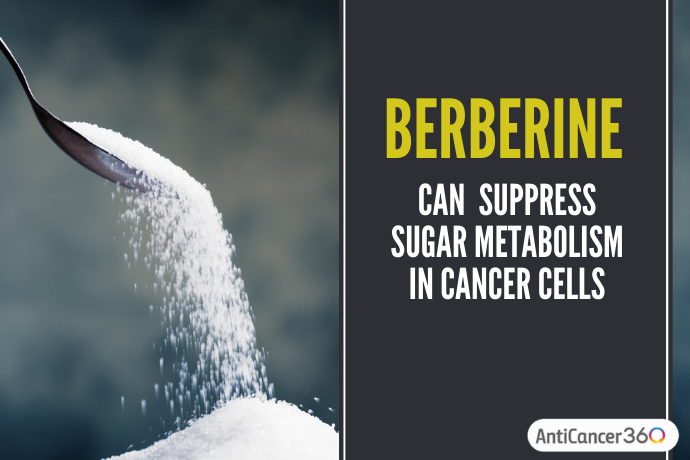
This laboratory study also revealed that berberine reduced the transcription of specific genes involved in glucose metabolism of colon cancer cells [6]. Transcription is the process in which genetic material is copied, leading to the production of functional proteins. Therefore, berberine may be a useful tool for starving cancer cells of glucose and enhancing the effect of other anti-cancer therapies.
Berberine may also help to block “oxidative phosphorylation,” another energy pathway that cancers can use to survive.
Oxidative phosphorylation (OxPHOS) is the metabolic process in which energy is released by the oxidation of nutrients and is transformed into chemical energy. Phosphorylation is a biochemical process that involves adding a phosphate group to an organic compound so that cells may use it.
Specifically, OxPHOS is the addition of phosphate to adenosine diphosphate (ADP) to form adenosine triphosphate (ATP). OxPHOS takes place in the inner membrane of the mitochondria of each cell. ATP is chemical energy and is the primary energy source for the cells of all living organisms [8].
Berberine has been demonstrated to block cancer cells’ mitochondrial complex I,9 which is the first of five mitochondrial complexes that perform oxidative phosphorylation [10]. By blocking OxPHOS, berberine prevents the tumor cell from turning glucose into energy.
In other words… berberine can help block sugar from nourishing the cancer, draining its energy, and may weaken the cancer overall.
Berberine May Block Cancer Metabolism of Glutamine
Cancer cells are continually adapting, and they need sources of energy to grow. So if a cancer cell is starved of its energy from glucose, it can redirect to other stores of energy like glutamine and fat.
Glutamine is the most abundant amino acid in our bodies. Amino acids are the building blocks of proteins that have numerous essential cell functions. Tumor cell proliferation demands a high level of glutamine metabolism. Finding ways to interfere with cancer cell glutamine metabolism is a logical objective of cancer research.
Glutamine is absorbed into cells by sodium-dependent transporters known as SLC1A5. When cancer cells adapt, they can actually grow more glutamine transporters compared to normal, healthy cells.
But berberine was able to suppress glutamine uptake in liver cancer cells by inhibiting SLC1A5 (glutamine transporter) in laboratory studies [11]. These researchers reported that berberine could inhibit glutamine metabolism in liver cancer cells without damaging healthy liver cells. They found that this was due to the high expression of SLC1A5 in cancer tissues.
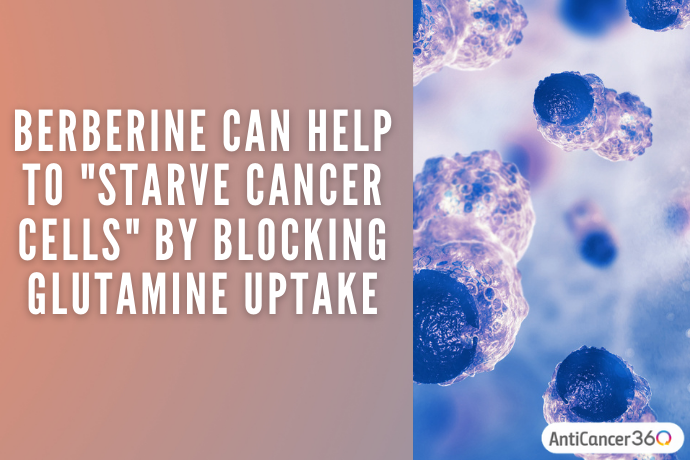
And, the berberine didn’t affect the healthy liver tissues since they had relatively low expression of SLC1A5 transporters. This distinction highlights berberine’s potential as a specific antitumor tool for starving liver cancer cells [11].
Another glutamine related pathway that berberine may help to target is something called “mTOR” (The mammalian target of rapamycin.)
mTOR is an enzyme (protein kinase) that is recognized as the principal regulator of animal growth, and is a crucial link between the availability of nutrients in the environment and metabolic control [12]. Scientists have learned that the mTOR pathway is activated during various cellular processes, such as tumor formation and insulin resistance, and becomes uncontrolled in cancer and type 2 diabetes.
Modulating the mTOR pathway is another therapeutic target of interest. Recent studies have confirmed that berberine inhibits the mTOR-signaling path as part of its anti-tumor effects.
The mammalian target of rapamycin (mTOR) is also a key regulator of autophagy. The literal meaning of autophagy is “self-eating” and is the body’s way of eliminating damaged cells to reconstruct new cells. Because of this, autophagy can also be involved in eliminating cancer cells.
Further scientific studies have revealed that berberine can have a significant impact on mTOR and the metabolism of brain cancer cells. Berberine’s effects on brain cancer cells included increased autophagy, reduced proliferation, and apoptosis (programmed cell death) [13].
Berberine Can Interrupt Cancer Metabolism of Fats
Another way that berberine helps to starve cancer is by interfering with the way cancer cells metabolize fats.
Fats (lipids, fatty acids, and cholesterol) are essential sources of energy for all cells in the human body. The metabolism of fats affects many essential cellular processes, including cell growth, proliferation, and survival. Consequently, the reprogramming of fatty acid metabolism plays a critical role in cancer progression [7].
Berberine has previously been established as a blood cholesterol-lowering agent [14]. Animal research has shown that berberine can lower cholesterol by helping to limit cholesterol absorption.1
Berberine’s ability to interrupt fat metabolism has potential anti-cancer effects. An overproduction of fatty acid-binding proteins (FABPs) occurs in many cancers such as kidney cell carcinoma, liver cell carcinoma, gastric (stomach) cancer, and breast cancer [7]. FABPs are key metabolic enzymes responsible for the control of fatty acid absorption from the blood and transport within cells.
Berberine reduces the cancer cell’s production of FABPs, which can help to starve cancer cells of fatty nutrients [7].
An interesting study demonstrated berberine to be an effective suppressor of lipogenesis (fat formation) in a specific type of lung cancer cells (G-R NSCLC: gefitinib-resistant nonsmall-cell lung cancer) and also in rheumatoid arthritis (RA) cells [15]. Berberine selectively inhibited the growth of the G-R NSCLC cells and RA cells, but not that of normal cells.
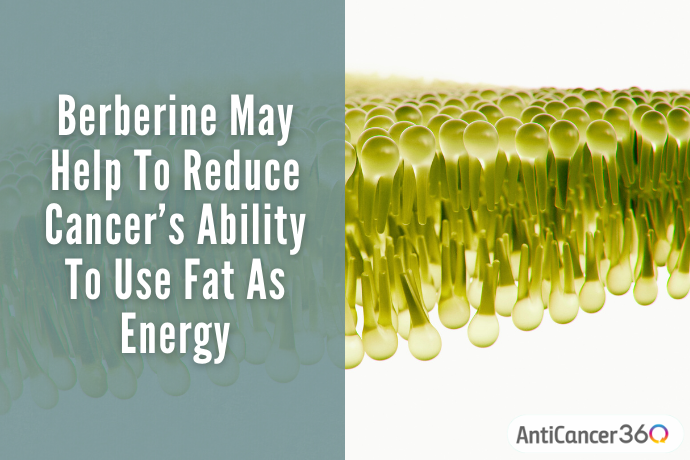
This study showed that berberine achieved this by suppressing SREBP1 (sterol regulatory element-binding protein 1) and lipogenesis regulated through reactive oxygen species (ROS)/AMPK (AMP-activated protein kinase) pathway [15].
Put simply, berberine may help to reduce cancer’s ability to use fat as energy, which results in cancer cell death.
Berberine as Part of the Aggressive Integrative Approach to Cancer Treatment
Synergistic Effects of Berberine on Cancer Stem Cells
Unfortunately, the prognosis for many cancer patients remains dismal because of the high rate of recurrence and drug resistance encountered after initial chemotherapy treatments.
Resistance occurs when cancers that have been previously responding to treatment, suddenly begin to grow again. The study of cancer stem cells has shed some light on why some tumors become resistant to multiple drugs.
Cancer stem cells are a small set of cancer cells that can self-renew and differentiate into different types of specialized cells, and can also seed tumors when transplanted into an animal host [16].

A study in 2012 showed that berberine reduced lung cancer cell growth but surprisingly increased the fraction of cancer stem cells, further increasing after co-treatment with fluorouracil chemotherapy [17].
In contrast, a 2013 study showed that berberine produced dose-dependent apoptosis (cell death) in breast cancer stem cells. The combination of berberine and paclitaxel chemotherapy produced an 85.5% tumor size reduction in mice after only 21 days [18].
So, it is important to consider berberine as part of an integrative, complementary approach along with traditional chemotherapy treatments, due to the mixed findings on berberine’s impact on cancer stem cells.
Berberine May Boost the Cancer-Killing Effects of Chemotherapy
Breast cancer is the most common cancer in women, and is commonly treated with doxorubicin chemotherapy. Breast cancer may initially respond to doxorubicin, but chemoresistance often occurs [19].
A study in laboratory mice demonstrated that, when taken together, berberine sensitized drug-resistant breast cancer to doxorubicin. This means that berberine enhanced the ability of doxorubicin to kill breast cancer that was previously showing resistance to this drug [19].
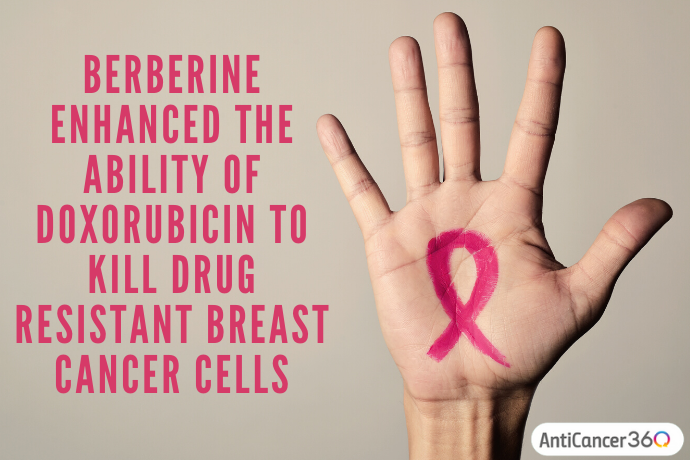
This study also indicated that berberine directly induced breast cancer cell death in mice. These researchers deemed berberine “a promising chemosensitizer and chemotherapeutic drug for breast cancer treatment.” [19]
Berberine May Strengthen the Effects of Radiation
Several natural substances have been found to enhance the effects of radiation on cancer cells.
In multiple research studies, berberine has been shown to have radiosensitizing effects. This means that berberine may improve the cancer-killing effects of radiation therapy in some forms of cancer, including esophageal, prostate, and breast cancers in human tissues [20].
How To Use Berberine: Dosages, Side Effects, and Precautions
Dosage
Berberine supplements are available as oral tablets or capsules. Most studies include dosages ranging from 1,000–1,500 mg per day. This dose of berberine can be divided into 500 mg two or three times per day to maintain a steady level throughout the day [1].
Side Effects
Berberine is generally considered safe and well-tolerated. The most commonly reported side effects are stomach upsets, such as diarrhea, constipation, flatulence, and vomiting. Less common side effects may include rash, headache, and elevated liver enzymes [1].
Interactions with Drugs and Supplements
Berberine has the potential to interact with prescription drugs and other natural supplements. Overall, there could be many unknown drug interactions that could happen with berberine, especially in relation to chemotherapy and other cancer related medications. This is by no means an exhaustive list of potential interactions.
- Blood sugar-lowering medications or natural supplements may cause additive hypoglycemia with berberine [1]. Examples include glimepiride, insulin, alpha-lipoic acid, fenugreek. Hypoglycemia risk could be managed with regular blood sugar checks and administering glucose in case of an emergency.
- Blood pressure-lowering medicines or natural supplements may cause additive hypotension with berberine [1]. Some examples include amlodipine, lisinopril, diuretics, and garlic.
- Anticoagulant or antiplatelet (blood-thinning) medications, herbs, or supplements may increase the risk of bleeding with berberine [1]. Some examples include aspirin, enoxaparin, heparin, and ginkgo.
- Medications metabolized by certain liver enzymes might cause drug interactions with berberine. Some medications are broken down in the liver by specific cytochrome P450 enzymes. Berberine might decrease how quickly the liver breaks down some medications, and berberine could possibly increase the effects or side effects of some medications. Talk with your healthcare provider if you take other medications.
Because of this, it’s important that you consult with your doctor or pharmacist before including any supplements in your program. Please share your updated medication and supplement list with your healthcare provider whenever a new addition is being considered.
Berberine May Be A Powerful Natural Weapon Against Cancer
Always discuss the risk-versus-benefit potential with your healthcare professional before starting any anticancer natural supplement, including berberine.
Overall, you can see that there can be many potential benefits to adding a supplement like berberine to your anticancer program. When you are fighting cancer, you want every possible weapon in your arsenal.
Berberine, among other natural supplements, may help reduce side effects of oncology treatments and improve your chances of success. Depending on your unique situation, why not fight cancer from every possible angle, especially with difficult or advanced cancers?
Ultimately, when using an “Aggressive Integrative Approach” to cancer, the goal is to fight cancer from every possible direction. This approach includes integrating the use of natural supplements to fight cancer based on available evidence, despite limited human data… and to do it in a way that won’t interfere with your oncology treatments.
How are you approaching your cancer treatments? Are you taking any natural or dietary supplements? Have you tried berberine and how have you felt since starting berberine? Have you made any other lifestyle changes that have made a noticeable difference in your fight against cancer? Please let us know in the comments below!
Are You A Candidate For Our Program?
If you’d like to learn more about the AntiCancer360 approach and see if we can help you… please watch our free online webinar to learn more about our approach. Then at the end, you’ll be able to schedule a free call with someone from our team so that we can discuss your case in more detail.
Citations
Dr. Patricia Weiser is one of AntiCancer360’s consultant pharmacists, science advisors, and medical writers. Her expertise helps us create safe herbal and supplement combinations and avoid potential drug interactions.
Patricia is a graduate of the University of Pittsburgh and a licensed pharmacist. She has clinical experience in both community and hospital pharmacy. She is passionate about integrative and preventative care and strives to empower her patients to take an active role in their health.

